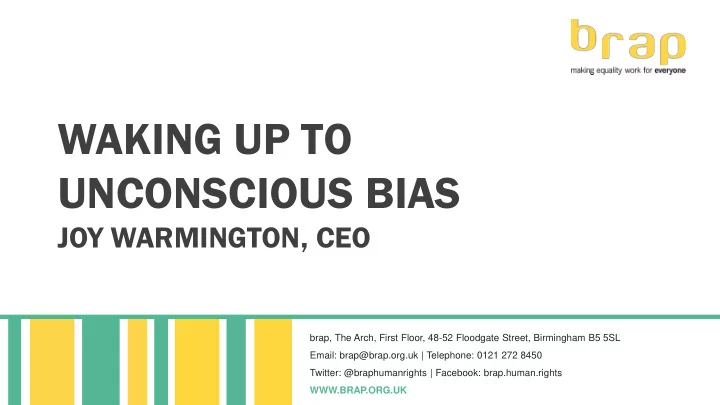

WAKING UP TO UNCONSCIOUS BIAS JOY WARMINGTON, CEO brap, The Arch, First Floor, 48-52 Floodgate Street, Birmingham B5 5SL Email: brap@brap.org.uk | Telephone: 0121 272 8450 Twitter: @braphumanrights | Facebook: brap.human.rights WWW.BRAP.ORG.UK
ABOUT BRAP • brap is an equalities and human rights charity • Our mission is to transform the way we think and do equality • We support organisations, communities, and cities • Learning, change, research, and community engagement • For more information please go to our website www.brap.org.uk www.brap.org.uk
Unconscious bias – definition Implicit bias refers to the attitudes or stereotypes that affect our understanding, actions, and decisions in an unconscious manner. These biases, which encompass both favourable and unfavourable assessments, are activated involuntarily and without an individual’s awareness or intentional control (Blair, 2002; Rudman, 2004a). Residing deep in the subconscious, these biases are different from known biases that individuals may choose to conceal for the purposes of social and/or political correctness. Source : State of the Science: Implicit Bias Review 2014 by Cheryl Staats www.brap.org.uk
TYPES PES OF BIA IAS 1. Affinity bias 2. Confirmation bias Affinity bias is an emotional bias that causes irrational decisions driven by In psychology and cognitive science, confirmation bias (or confirmatory perception and reflection of values. bias ) is a tendency to search for or interpret information in a way that confirms one's preconceptions, leading to errors. Examples: Examples: people who look like us, sound like us, behave like us = favouritism based upon stereotypes, .e.g. we search for or interpret information re educational background, social class, hobbies and interests that is selective and confirms our existing perceptions affects perceptions of competence thus affecting hiring and use ambiguous evidence to support an existing position talent/people management decisions this leads decision-makers and others to weight information that we ignore faults of people we like and notice more faults of people confirms existing viewpoints as well as ignore, discount or be blind to from groups we unconsciously don’t like information that may contradict existing perceptions 3. Attribution bias In psychology, an attribution bias or attributional bias is a cognitive bias that refers to the systematic errors made when people evaluate or try to find reasons for their own and others' behaviours. Examples : if someone is part of your ‘in group’ your evaluation of their successes are likely to be based on your belief in their knowledge, skills and attributes if someone is part of your ‘out group’ your evaluation of their successes are likely to be based on external factors – the people they worked with, the support that they had etc. if someone is part of your ‘in group’ your evaluation of their failures is likely to be based on external factors – situations outside of their control if someone is part of your ‘out group’ your evaluation of their failures is likely to be based to their lack of skills, knowledge or attributes. www.brap.org.uk
HOW TO ADDRESS YOUR BIASES? • Unconscious bias – difficult to spot, not the same as prejudices • You can see the impact of unconscious bias in what we do – review your own patterns and trends, who you like/dislike etc • Bias is like a muscle – you can exercise it! • Think about how you make critical decisions, remember when you are in a rush – your unconscious takes over www.brap.org.uk
HO HOW TO W TO DE DE-BIAS BIAS What kinds of things do I How is bias reinforced by me and What strategies can I use need to be mindful of? others around me? to help de-bias? Write things down – your brain doesn’t have the Who I like and dislike Media capacity to be objective How I use my time, who gets it Types of people that are promoted, recruited Avoid making big decisions when you are My levels of comfort with different Who I see in positions of power -roles stressed people people hold, i.e. women, BME, cleaners / Review the basis for your decisions and ask What I’ve heard about other people security? yourself if there is objective data to support your – both positive and negative Who holds the status of being a good leader action or if unconscious bias is at work My own listening skills – things that and how they lead Benchmarking, look back at the decisions you have made – why do ratings differ? Can you I find uncomfortable to hear about How others, including myself, talk about substantiate them? groups of people and my own ‘in’ and ‘out’ myself and others Practise negative feedback My body language – it can leak my groups Set up peer learning processes to help you to feelings Rewards / sanctions by enhance your objectivity and to actively notice Information that ‘feeds’ my own organisations/individuals connected to the all bias types stereotypes and justifies my system Deliberately step outside your comfort zone behaviour /decision-making Unwillingness to challenge the status quo Being with ‘like - minded’ people that High potential to reinforce the status quo – reinforce my own beliefs attribution bias My ‘gut instinct’ Whose potential has been spotted – who’s being championed? www.brap.org.uk
ADDRESSING BIAS WITHIN AN ORGANISATION • Important that individuals are aware of their biases – but recognise that they will need support • Organisations need to help mitigate for biases by putting in place actions which can change the behaviour of individuals • Organisations need to develop a narrative in which biases can be openly discussed and supportively challenged • Bias training is helpful – but not on its own! www.brap.org.uk
TRANSFORMING THE WAY WE THINK AND DO EQUALITY www.brap.org.uk
Recommend
More recommend